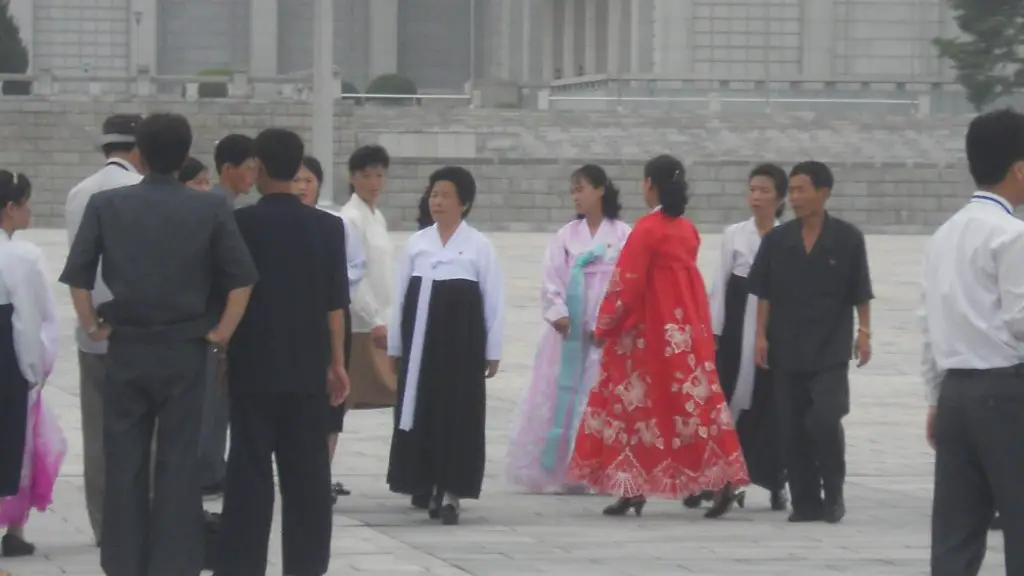Background Information
The Korean War (1950–1953) was a fight between North Korea and South Korea. North Korea was backed by the communist nations of China and the Soviet Union, while South Korea was backed by the United Nations forces largely made up of troops from the United States. The war saw some of the bloodiest battles of the Cold War, with hundreds of thousands of Korean people, American and Chinese soldiers killed in action.
The main reason for the war was a disagreement over which government should be in control of the Korean peninsula. North Korea wanted to establish a communist government, while South Korea wanted to keep the peninsula under its democratic rule. North Korea invaded South Korea in June 1950, with the aim of reunifying the peninsula. In response, the United Nations authorized a “police action” to stop the North Korean forces, with the US leading a coalition of different nations.
Relevant Data
The Korean War was one of the deadliest conflicts of the twentieth century. The United Nations estimated that more than three million Koreans were killed in the fighting, with around three hundred thousand Chinese soldiers and fifty-two thousand Americans also killed or injured. The total number of casualties is thought to be around 4 million.
The war also had a devastating economic impact on Korea. The country was impoverished and its infrastructure was destroyed by the intense fighting, with economic losses estimated to be around $8 billion. It was also estimated that the war cost the US $32 billion, with China also spending billions.
Expert Perspectives
Many experts say that the primary cause of the Korean War was the Cold War rivalry between the United States and the Soviet Union. By 1950, they had divided the world into two blocs of power, with the US and its allies on one side and the Soviet Union and its allies on the other. In Korea, these rivalries had come to a head, with North Korea wanting to wrest control of the peninsula from South Korea.
In addition, some experts say that American foreign policy at the time played a part in causing the war. The US had been following a policy of “containment”, in which it sought to prevent the spread of communism. This policy led it to intervene in conflicts around the world, and the Korean conflict was no exception.
Personal Insights and Analysis
From my perspective, the Korean War was a tragic and unnecessary conflict that cost the lives of millions of people. It was a manifestation of the tensions between the two opposing superpowers of the time, and was a product of the Cold War. It serves as a stark reminder of the potential consequences of unchecked conflict between powerful nations.
The Korean War also had a major impact on Korea itself. The country was devastated by the conflict, with millions dead and its infrastructure severely damaged. It took decades for the country to recover, and today, it remains divided, with North and South Korea separate countries, each with its own government.
International Relations
The Korean War had a major impact on international relations. It strengthened the Cold War rivalry between the United States and the Soviet Union, and it led to an increase in military spending by both sides. It also led to a shift in the balance of power in East Asia, with Japan taking over from China as the dominant economic and military power in the region.
The Korean War also had a profound impact on the United Nations. The conflict was the first major test for the organization, and it showed that the UN had the power to intervene in conflicts and maintain global peace. This made the UN a powerful institution and helped to give it legitimacy in the eyes of the international community.
Political Implications
The Korean War also had a major political impact. It led to a strengthening of the United States’ commitment to political and economic freedom in the region, and it increased its support for South Korea. It also led to a strengthening of ties between the US and Japan, which remains one of America’s closest allies.
The war also had implications for the United States’ relationship with China. The US saw China as a potential ally in the Cold War, but after the war, it began to view China as an enemy. This tension between the two countries lasted for decades, and it continues to this day.
Consequences For South and North Korea
The Korean War had a major impact on both North and South Korea. In South Korea, the war led to an increase in the economy and a strengthening of democracy. In North Korea, the war led to an isolation from the rest of the world and a strengthening of the government’s control over the people.
For both countries, the war was a tragedy that changed the course of their history. It left millions dead and wounded, and it caused a division between the two countries that still exists to this day. It is a sad reminder of the consequences of unchecked conflict.
Long-Term Impact
The Korean War had a major impact on the world, with its consequences still being felt today. It led to an increase in military spending by the United States and its allies, and it strengthened ties between Japan and the US. It also led to a renewed focus on political and economic freedom in East Asia.
The war also led to an increase in international cooperation, with the United Nations gaining even more legitimacy after its involvement in the conflict. The UN’s role in helping to maintain peace and security has only grown since the Korean War, and it is now one of the most powerful international organizations in the world.




